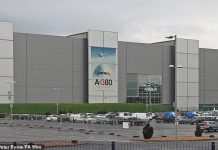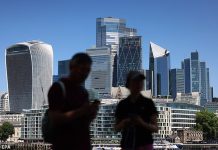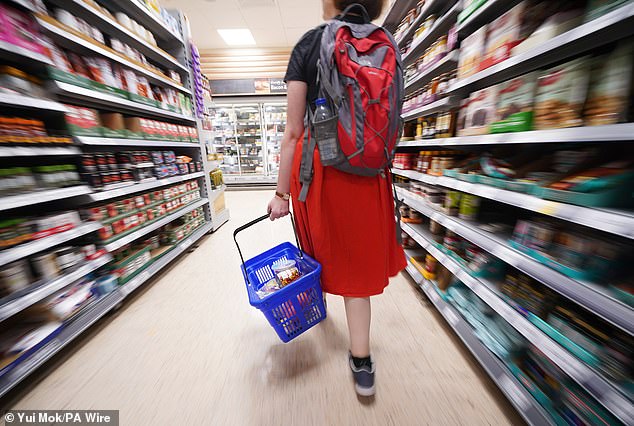Only a hermit living on a desert island could not have known that inflation was rising sharply again.
Which is why it was such nonsense to hear economists saying yesterday that the latest leap in prices for July came in higher than expected.
They really were not. Any business owner or regular shopper – or indeed anybody who lives in the real world – could have told them weeks ago that prices were jumping up across the board.
You can see it daily in your food shop or when you are filling up with fuel, or as the latest figures show, going on an overseas summer holiday.
According to the Office for National Statistics (ONS), the rise to 3.8 per cent for the year to July – the highest level since January last year – was driven mainly by higher prices for food, transport and flying.
The ONS says that much of the increase is because of an astonishing 30.2 per cent rocketing of air fares, the highest jump in that period for more than two decades.

Costs crunch: According to the Office for National Statistics, the rise in UK inflation to 3.8% for the year to July was driven mainly by higher prices for food, transport and flying
What we don’t know is whether all of the increase was due to airlines bumping up prices to take advantage of the school holidays, in other words another example of greed inflation.
Or because global prices for jet fuel shot up. It appears to be a bit of both. The global Jet Fuel Monitor shows a small uptick in prices on the month.
Other products that also rose month-on-month were those for beef, chocolate, fresh orange juice and instant coffee, rises more easily understood as they relate to higher energy and labour costs directly due to the tax hikes in the last Budget.
So it was no surprise at all to see food and non-alcoholic drink inflation rising to 4.9 per cent in the year to July, the fourth month in a row, taking prices to their highest since the start of last year.
The more interesting question to ask is why UK inflation remains so very sticky, and why we are such an outlier compared to our European neighbours.
Those who have been able to afford to fly abroad will know all too well that UK prices are rising four times as fast as France, and twice as high as those in Italy and Germany.
By far the biggest factor is the UK’s reliance on imported energy, particularly gas, which under our ‘marginal pricing’ system means that the gas price sets the rate of other energy sources.
Gas provides about 40 per cent of the UK’s electricity and is used to heat 85 per cent of our homes.
And gas prices are still far higher than before Russia’s invasion of Ukraine, which sent gas prices spiralling, and the UK’s government-set price cap soaring. Then you also have the huge subsidies going into renewables.
Most European countries are nowhere near so dependent on gas. Fewer than half of French and German homes are heated with gas.
At the same time, most of their housing stock is much better insulated than ours.
Worker shortages in key industries such as hospitality, farming and agriculture and transport is another big factor, pushing up wages and therefore inflation as businesses pass on the cost.
And these are shortages which have become more acute since the pandemic and made worse through over-regulation and hobbled now by higher taxes. Yet we have hundreds of thousands, if not millions of individuals, the so-called ‘economically inactive’, who could be filling many of these vacancies.
And the reason they are not willing – or able – to do so is partly because of our generous yet rigid welfare system but also because far too many either lack the skills or indeed the confidence to return to the workplace.
Interestingly, most European countries recovered more quickly from the lockdowns, and have not seen such a crippling impact on the workplace or on wage increases. Maybe their compensation schemes were not so generous?
Whatever the reason, UK prices remain stubbornly high and have further to rise despite money supply growth having slowed down.
This means that bond yields will stay high and interest rates are not coming down anytime soon. Even that last cut was too little, too late.
Yet there is so much that could be done to improve the more sclerotic parts of the economy with bold and brave reforms.
Tragically, we don’t seem to have the politicians capable of carrying them through. Even worse, they don’t seem to understand what’s needed to do so.
DIY INVESTING PLATFORMS

AJ Bell

AJ Bell
Easy investing and ready-made portfolios

Hargreaves Lansdown

Hargreaves Lansdown
Free fund dealing and investment ideas

interactive investor

interactive investor
Flat-fee investing from £4.99 per month

InvestEngine

InvestEngine
Account and trading fee-free ETF investing
Trading 212
Trading 212
Free share dealing and no account fee
Affiliate links: If you take out a product This is Money may earn a commission. These deals are chosen by our editorial team, as we think they are worth highlighting. This does not affect our editorial independence.
Compare the best investing account for you
#Inflation #climbing #Labour #isnt #bold #whats #needed #MAGGIE #PAGANO
















